Adult Nursing Practice: Reflection on Patient's Death Experience
VerifiedAdded on 2020/10/22
|12
|3424
|77
Report
AI Summary
This report provides a reflective analysis of a student's experience with a patient's death in an adult nursing setting. The student utilizes the Driscoll model to examine the events, emotions, and actions surrounding the patient's end-of-life care. The patient, a 70-year-old man with advanced lung cancer and respiratory problems, received palliative care. The student describes the patient's condition, the care provided, and the suddenness of his death. The analysis delves into the student's emotional response, ethical considerations, and the importance of holistic and person-centered care. The report highlights the role of nurses in providing emotional support, ethical decision-making, and effective communication with both the patient and their family. The student reflects on professional and ethical issues encountered, emphasizing the significance of empathy and understanding in nursing practice. The report underscores the importance of advanced care planning and the need for nurses to provide dignified and respectful care, especially during end-of-life situations.
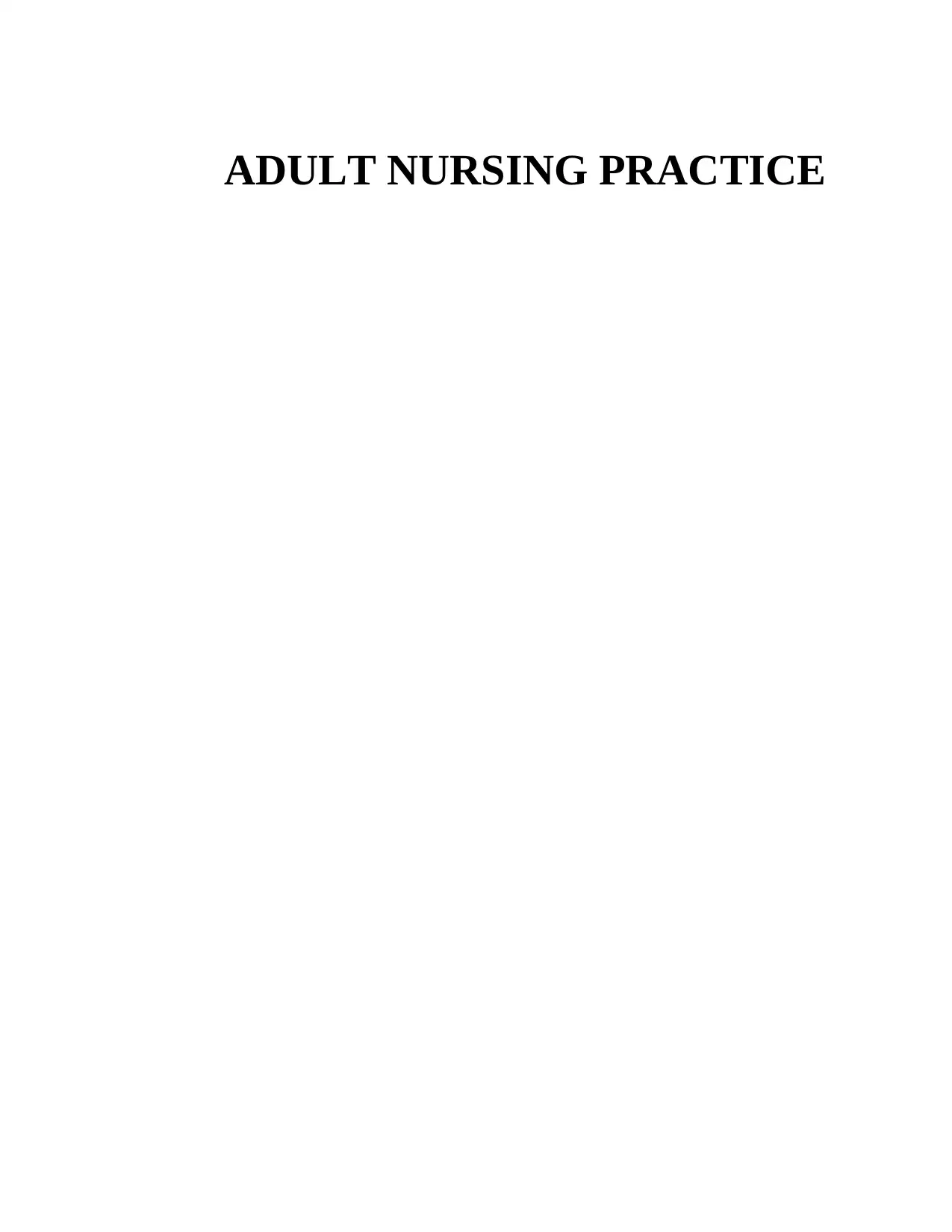
ADULT NURSING PRACTICE
Paraphrase This Document
Need a fresh take? Get an instant paraphrase of this document with our AI Paraphraser
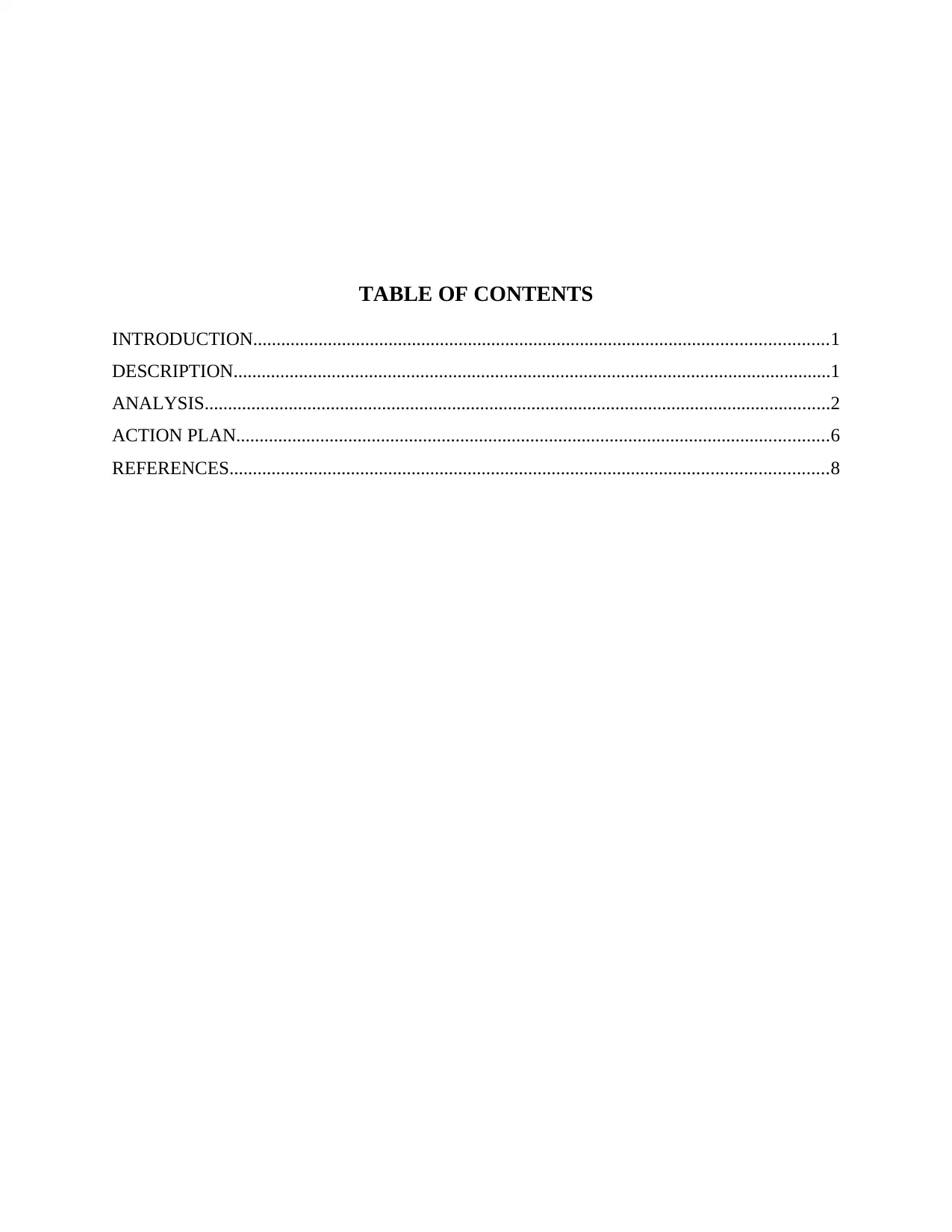
TABLE OF CONTENTS
INTRODUCTION...........................................................................................................................1
DESCRIPTION................................................................................................................................1
ANALYSIS......................................................................................................................................2
ACTION PLAN...............................................................................................................................6
REFERENCES................................................................................................................................8
INTRODUCTION...........................................................................................................................1
DESCRIPTION................................................................................................................................1
ANALYSIS......................................................................................................................................2
ACTION PLAN...............................................................................................................................6
REFERENCES................................................................................................................................8
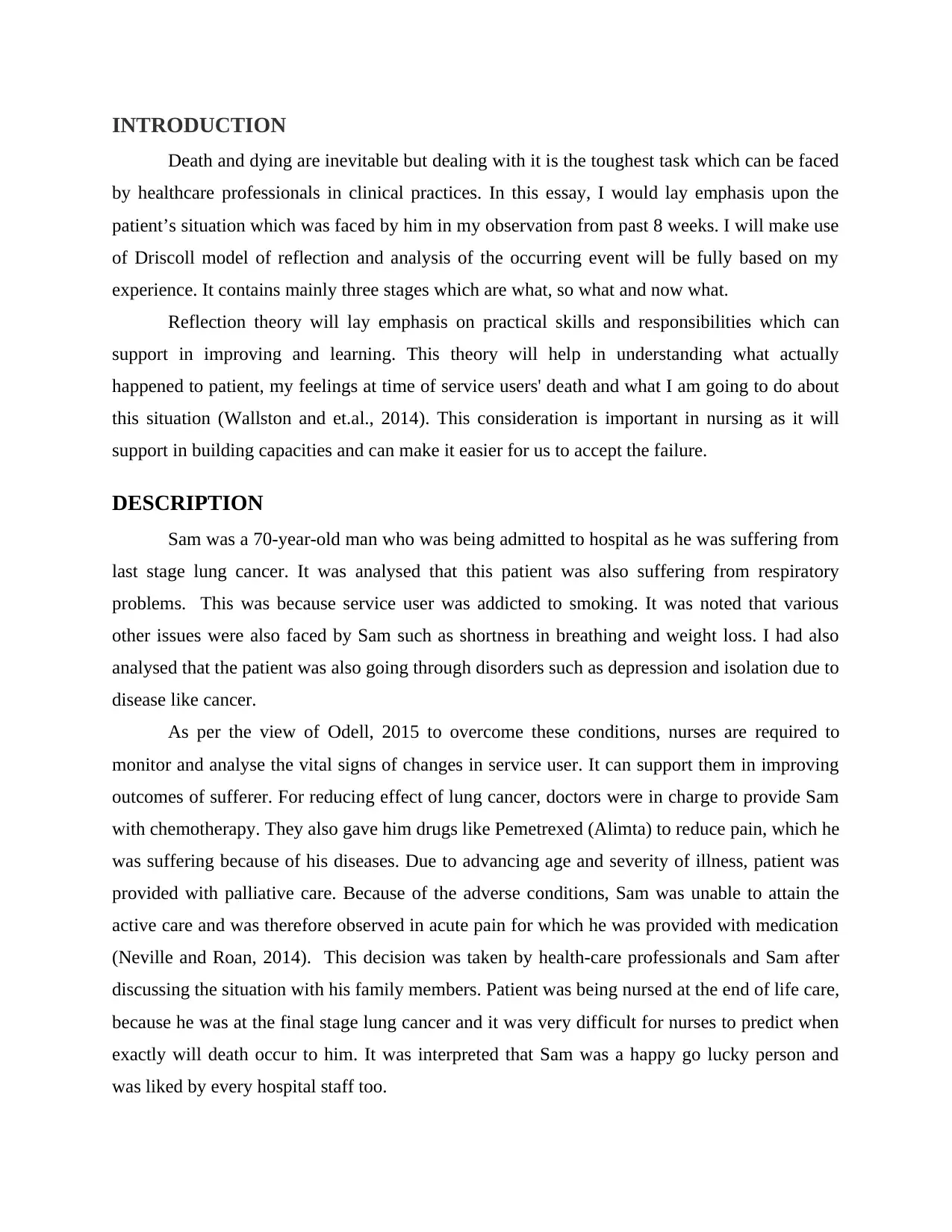
INTRODUCTION
Death and dying are inevitable but dealing with it is the toughest task which can be faced
by healthcare professionals in clinical practices. In this essay, I would lay emphasis upon the
patient’s situation which was faced by him in my observation from past 8 weeks. I will make use
of Driscoll model of reflection and analysis of the occurring event will be fully based on my
experience. It contains mainly three stages which are what, so what and now what.
Reflection theory will lay emphasis on practical skills and responsibilities which can
support in improving and learning. This theory will help in understanding what actually
happened to patient, my feelings at time of service users' death and what I am going to do about
this situation (Wallston and et.al., 2014). This consideration is important in nursing as it will
support in building capacities and can make it easier for us to accept the failure.
DESCRIPTION
Sam was a 70-year-old man who was being admitted to hospital as he was suffering from
last stage lung cancer. It was analysed that this patient was also suffering from respiratory
problems. This was because service user was addicted to smoking. It was noted that various
other issues were also faced by Sam such as shortness in breathing and weight loss. I had also
analysed that the patient was also going through disorders such as depression and isolation due to
disease like cancer.
As per the view of Odell, 2015 to overcome these conditions, nurses are required to
monitor and analyse the vital signs of changes in service user. It can support them in improving
outcomes of sufferer. For reducing effect of lung cancer, doctors were in charge to provide Sam
with chemotherapy. They also gave him drugs like Pemetrexed (Alimta) to reduce pain, which he
was suffering because of his diseases. Due to advancing age and severity of illness, patient was
provided with palliative care. Because of the adverse conditions, Sam was unable to attain the
active care and was therefore observed in acute pain for which he was provided with medication
(Neville and Roan, 2014). This decision was taken by health-care professionals and Sam after
discussing the situation with his family members. Patient was being nursed at the end of life care,
because he was at the final stage lung cancer and it was very difficult for nurses to predict when
exactly will death occur to him. It was interpreted that Sam was a happy go lucky person and
was liked by every hospital staff too.
Death and dying are inevitable but dealing with it is the toughest task which can be faced
by healthcare professionals in clinical practices. In this essay, I would lay emphasis upon the
patient’s situation which was faced by him in my observation from past 8 weeks. I will make use
of Driscoll model of reflection and analysis of the occurring event will be fully based on my
experience. It contains mainly three stages which are what, so what and now what.
Reflection theory will lay emphasis on practical skills and responsibilities which can
support in improving and learning. This theory will help in understanding what actually
happened to patient, my feelings at time of service users' death and what I am going to do about
this situation (Wallston and et.al., 2014). This consideration is important in nursing as it will
support in building capacities and can make it easier for us to accept the failure.
DESCRIPTION
Sam was a 70-year-old man who was being admitted to hospital as he was suffering from
last stage lung cancer. It was analysed that this patient was also suffering from respiratory
problems. This was because service user was addicted to smoking. It was noted that various
other issues were also faced by Sam such as shortness in breathing and weight loss. I had also
analysed that the patient was also going through disorders such as depression and isolation due to
disease like cancer.
As per the view of Odell, 2015 to overcome these conditions, nurses are required to
monitor and analyse the vital signs of changes in service user. It can support them in improving
outcomes of sufferer. For reducing effect of lung cancer, doctors were in charge to provide Sam
with chemotherapy. They also gave him drugs like Pemetrexed (Alimta) to reduce pain, which he
was suffering because of his diseases. Due to advancing age and severity of illness, patient was
provided with palliative care. Because of the adverse conditions, Sam was unable to attain the
active care and was therefore observed in acute pain for which he was provided with medication
(Neville and Roan, 2014). This decision was taken by health-care professionals and Sam after
discussing the situation with his family members. Patient was being nursed at the end of life care,
because he was at the final stage lung cancer and it was very difficult for nurses to predict when
exactly will death occur to him. It was interpreted that Sam was a happy go lucky person and
was liked by every hospital staff too.
⊘ This is a preview!⊘
Do you want full access?
Subscribe today to unlock all pages.

Trusted by 1+ million students worldwide
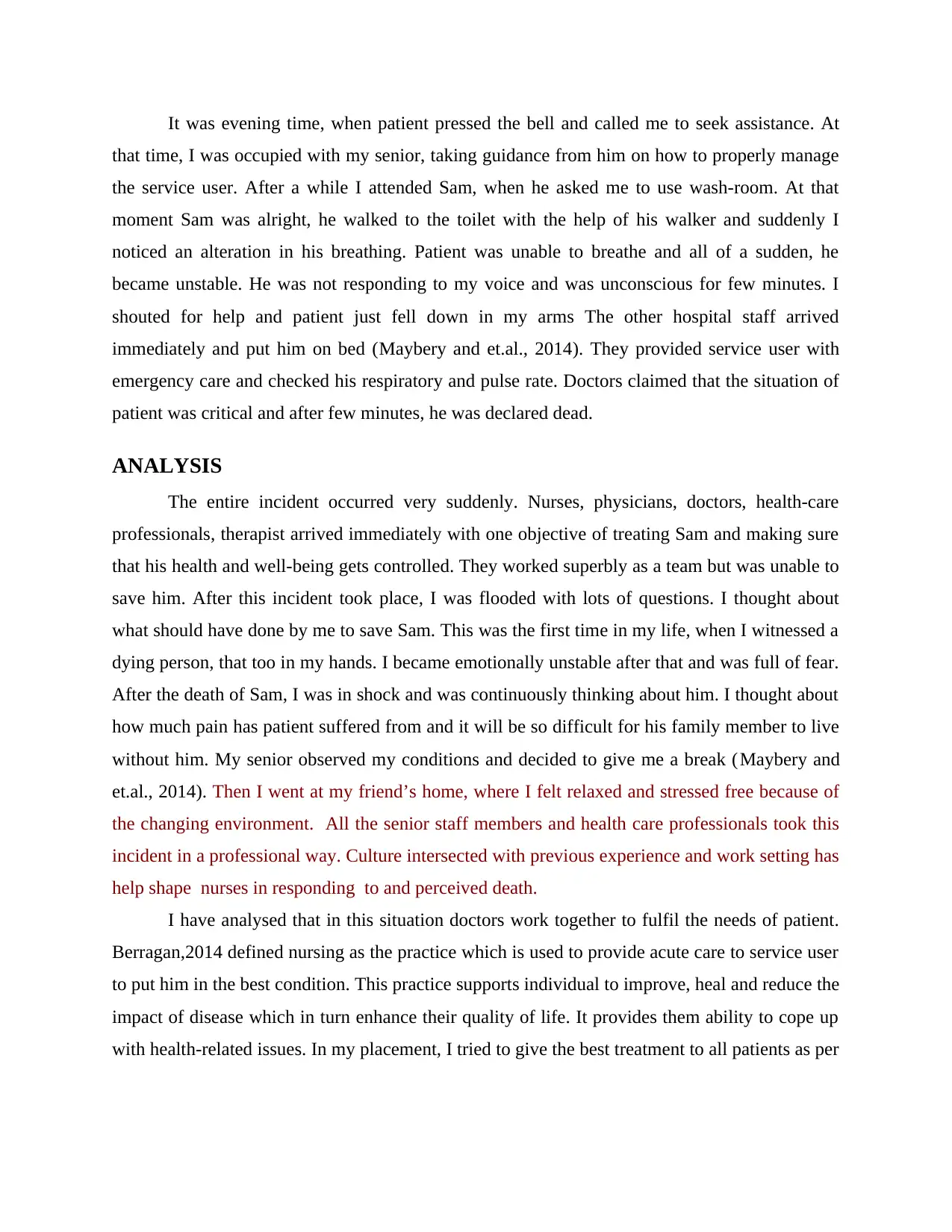
It was evening time, when patient pressed the bell and called me to seek assistance. At
that time, I was occupied with my senior, taking guidance from him on how to properly manage
the service user. After a while I attended Sam, when he asked me to use wash-room. At that
moment Sam was alright, he walked to the toilet with the help of his walker and suddenly I
noticed an alteration in his breathing. Patient was unable to breathe and all of a sudden, he
became unstable. He was not responding to my voice and was unconscious for few minutes. I
shouted for help and patient just fell down in my arms The other hospital staff arrived
immediately and put him on bed (Maybery and et.al., 2014). They provided service user with
emergency care and checked his respiratory and pulse rate. Doctors claimed that the situation of
patient was critical and after few minutes, he was declared dead.
ANALYSIS
The entire incident occurred very suddenly. Nurses, physicians, doctors, health-care
professionals, therapist arrived immediately with one objective of treating Sam and making sure
that his health and well-being gets controlled. They worked superbly as a team but was unable to
save him. After this incident took place, I was flooded with lots of questions. I thought about
what should have done by me to save Sam. This was the first time in my life, when I witnessed a
dying person, that too in my hands. I became emotionally unstable after that and was full of fear.
After the death of Sam, I was in shock and was continuously thinking about him. I thought about
how much pain has patient suffered from and it will be so difficult for his family member to live
without him. My senior observed my conditions and decided to give me a break (Maybery and
et.al., 2014). Then I went at my friend’s home, where I felt relaxed and stressed free because of
the changing environment. All the senior staff members and health care professionals took this
incident in a professional way. Culture intersected with previous experience and work setting has
help shape nurses in responding to and perceived death.
I have analysed that in this situation doctors work together to fulfil the needs of patient.
Berragan,2014 defined nursing as the practice which is used to provide acute care to service user
to put him in the best condition. This practice supports individual to improve, heal and reduce the
impact of disease which in turn enhance their quality of life. It provides them ability to cope up
with health-related issues. In my placement, I tried to give the best treatment to all patients as per
that time, I was occupied with my senior, taking guidance from him on how to properly manage
the service user. After a while I attended Sam, when he asked me to use wash-room. At that
moment Sam was alright, he walked to the toilet with the help of his walker and suddenly I
noticed an alteration in his breathing. Patient was unable to breathe and all of a sudden, he
became unstable. He was not responding to my voice and was unconscious for few minutes. I
shouted for help and patient just fell down in my arms The other hospital staff arrived
immediately and put him on bed (Maybery and et.al., 2014). They provided service user with
emergency care and checked his respiratory and pulse rate. Doctors claimed that the situation of
patient was critical and after few minutes, he was declared dead.
ANALYSIS
The entire incident occurred very suddenly. Nurses, physicians, doctors, health-care
professionals, therapist arrived immediately with one objective of treating Sam and making sure
that his health and well-being gets controlled. They worked superbly as a team but was unable to
save him. After this incident took place, I was flooded with lots of questions. I thought about
what should have done by me to save Sam. This was the first time in my life, when I witnessed a
dying person, that too in my hands. I became emotionally unstable after that and was full of fear.
After the death of Sam, I was in shock and was continuously thinking about him. I thought about
how much pain has patient suffered from and it will be so difficult for his family member to live
without him. My senior observed my conditions and decided to give me a break (Maybery and
et.al., 2014). Then I went at my friend’s home, where I felt relaxed and stressed free because of
the changing environment. All the senior staff members and health care professionals took this
incident in a professional way. Culture intersected with previous experience and work setting has
help shape nurses in responding to and perceived death.
I have analysed that in this situation doctors work together to fulfil the needs of patient.
Berragan,2014 defined nursing as the practice which is used to provide acute care to service user
to put him in the best condition. This practice supports individual to improve, heal and reduce the
impact of disease which in turn enhance their quality of life. It provides them ability to cope up
with health-related issues. In my placement, I tried to give the best treatment to all patients as per
Paraphrase This Document
Need a fresh take? Get an instant paraphrase of this document with our AI Paraphraser
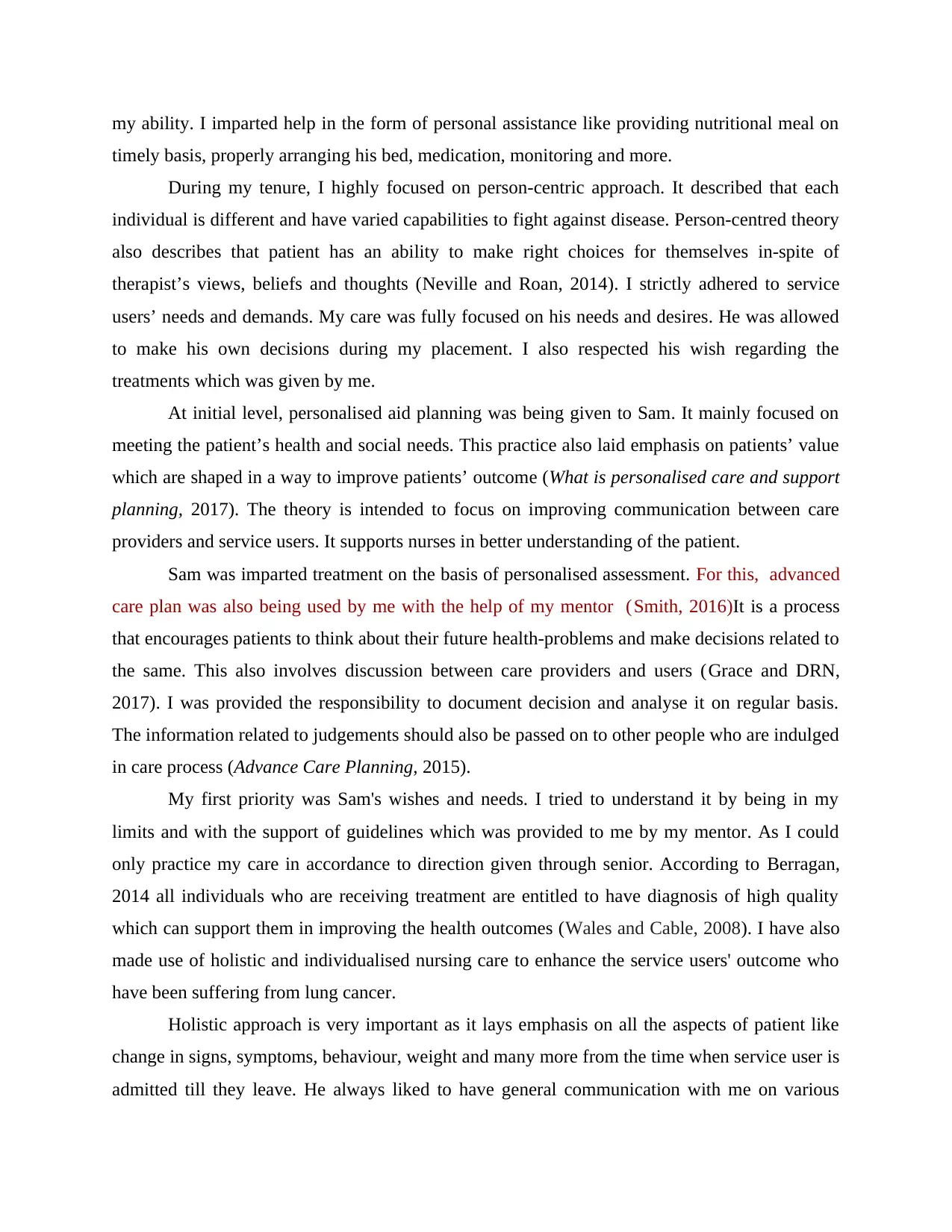
my ability. I imparted help in the form of personal assistance like providing nutritional meal on
timely basis, properly arranging his bed, medication, monitoring and more.
During my tenure, I highly focused on person-centric approach. It described that each
individual is different and have varied capabilities to fight against disease. Person-centred theory
also describes that patient has an ability to make right choices for themselves in-spite of
therapist’s views, beliefs and thoughts (Neville and Roan, 2014). I strictly adhered to service
users’ needs and demands. My care was fully focused on his needs and desires. He was allowed
to make his own decisions during my placement. I also respected his wish regarding the
treatments which was given by me.
At initial level, personalised aid planning was being given to Sam. It mainly focused on
meeting the patient’s health and social needs. This practice also laid emphasis on patients’ value
which are shaped in a way to improve patients’ outcome (What is personalised care and support
planning, 2017). The theory is intended to focus on improving communication between care
providers and service users. It supports nurses in better understanding of the patient.
Sam was imparted treatment on the basis of personalised assessment. For this, advanced
care plan was also being used by me with the help of my mentor (Smith, 2016)It is a process
that encourages patients to think about their future health-problems and make decisions related to
the same. This also involves discussion between care providers and users (Grace and DRN,
2017). I was provided the responsibility to document decision and analyse it on regular basis.
The information related to judgements should also be passed on to other people who are indulged
in care process (Advance Care Planning, 2015).
My first priority was Sam's wishes and needs. I tried to understand it by being in my
limits and with the support of guidelines which was provided to me by my mentor. As I could
only practice my care in accordance to direction given through senior. According to Berragan,
2014 all individuals who are receiving treatment are entitled to have diagnosis of high quality
which can support them in improving the health outcomes (Wales and Cable, 2008). I have also
made use of holistic and individualised nursing care to enhance the service users' outcome who
have been suffering from lung cancer.
Holistic approach is very important as it lays emphasis on all the aspects of patient like
change in signs, symptoms, behaviour, weight and many more from the time when service user is
admitted till they leave. He always liked to have general communication with me on various
timely basis, properly arranging his bed, medication, monitoring and more.
During my tenure, I highly focused on person-centric approach. It described that each
individual is different and have varied capabilities to fight against disease. Person-centred theory
also describes that patient has an ability to make right choices for themselves in-spite of
therapist’s views, beliefs and thoughts (Neville and Roan, 2014). I strictly adhered to service
users’ needs and demands. My care was fully focused on his needs and desires. He was allowed
to make his own decisions during my placement. I also respected his wish regarding the
treatments which was given by me.
At initial level, personalised aid planning was being given to Sam. It mainly focused on
meeting the patient’s health and social needs. This practice also laid emphasis on patients’ value
which are shaped in a way to improve patients’ outcome (What is personalised care and support
planning, 2017). The theory is intended to focus on improving communication between care
providers and service users. It supports nurses in better understanding of the patient.
Sam was imparted treatment on the basis of personalised assessment. For this, advanced
care plan was also being used by me with the help of my mentor (Smith, 2016)It is a process
that encourages patients to think about their future health-problems and make decisions related to
the same. This also involves discussion between care providers and users (Grace and DRN,
2017). I was provided the responsibility to document decision and analyse it on regular basis.
The information related to judgements should also be passed on to other people who are indulged
in care process (Advance Care Planning, 2015).
My first priority was Sam's wishes and needs. I tried to understand it by being in my
limits and with the support of guidelines which was provided to me by my mentor. As I could
only practice my care in accordance to direction given through senior. According to Berragan,
2014 all individuals who are receiving treatment are entitled to have diagnosis of high quality
which can support them in improving the health outcomes (Wales and Cable, 2008). I have also
made use of holistic and individualised nursing care to enhance the service users' outcome who
have been suffering from lung cancer.
Holistic approach is very important as it lays emphasis on all the aspects of patient like
change in signs, symptoms, behaviour, weight and many more from the time when service user is
admitted till they leave. He always liked to have general communication with me on various
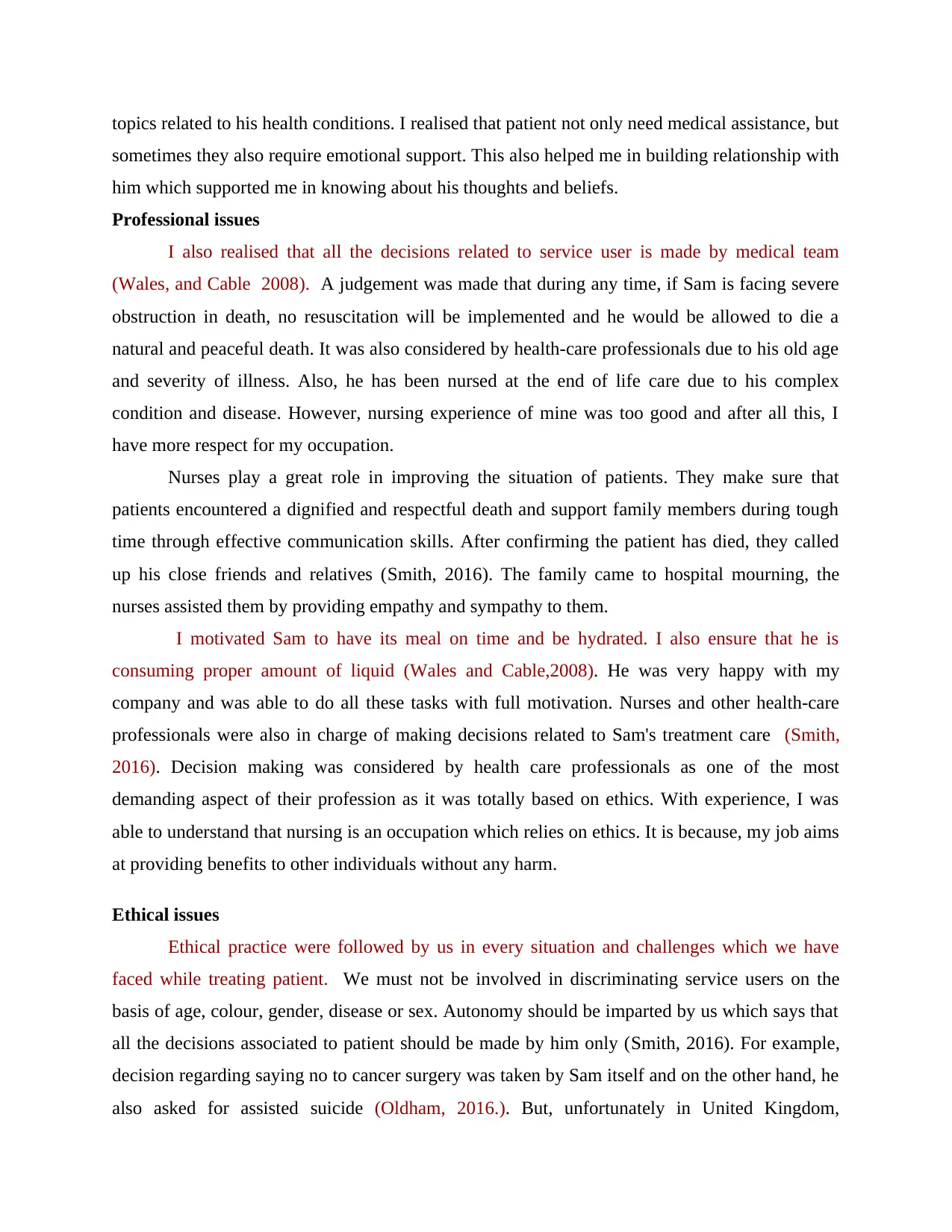
topics related to his health conditions. I realised that patient not only need medical assistance, but
sometimes they also require emotional support. This also helped me in building relationship with
him which supported me in knowing about his thoughts and beliefs.
Professional issues
I also realised that all the decisions related to service user is made by medical team
(Wales, and Cable 2008). A judgement was made that during any time, if Sam is facing severe
obstruction in death, no resuscitation will be implemented and he would be allowed to die a
natural and peaceful death. It was also considered by health-care professionals due to his old age
and severity of illness. Also, he has been nursed at the end of life care due to his complex
condition and disease. However, nursing experience of mine was too good and after all this, I
have more respect for my occupation.
Nurses play a great role in improving the situation of patients. They make sure that
patients encountered a dignified and respectful death and support family members during tough
time through effective communication skills. After confirming the patient has died, they called
up his close friends and relatives (Smith, 2016). The family came to hospital mourning, the
nurses assisted them by providing empathy and sympathy to them.
I motivated Sam to have its meal on time and be hydrated. I also ensure that he is
consuming proper amount of liquid (Wales and Cable,2008). He was very happy with my
company and was able to do all these tasks with full motivation. Nurses and other health-care
professionals were also in charge of making decisions related to Sam's treatment care (Smith,
2016). Decision making was considered by health care professionals as one of the most
demanding aspect of their profession as it was totally based on ethics. With experience, I was
able to understand that nursing is an occupation which relies on ethics. It is because, my job aims
at providing benefits to other individuals without any harm.
Ethical issues
Ethical practice were followed by us in every situation and challenges which we have
faced while treating patient. We must not be involved in discriminating service users on the
basis of age, colour, gender, disease or sex. Autonomy should be imparted by us which says that
all the decisions associated to patient should be made by him only (Smith, 2016). For example,
decision regarding saying no to cancer surgery was taken by Sam itself and on the other hand, he
also asked for assisted suicide (Oldham, 2016.). But, unfortunately in United Kingdom,
sometimes they also require emotional support. This also helped me in building relationship with
him which supported me in knowing about his thoughts and beliefs.
Professional issues
I also realised that all the decisions related to service user is made by medical team
(Wales, and Cable 2008). A judgement was made that during any time, if Sam is facing severe
obstruction in death, no resuscitation will be implemented and he would be allowed to die a
natural and peaceful death. It was also considered by health-care professionals due to his old age
and severity of illness. Also, he has been nursed at the end of life care due to his complex
condition and disease. However, nursing experience of mine was too good and after all this, I
have more respect for my occupation.
Nurses play a great role in improving the situation of patients. They make sure that
patients encountered a dignified and respectful death and support family members during tough
time through effective communication skills. After confirming the patient has died, they called
up his close friends and relatives (Smith, 2016). The family came to hospital mourning, the
nurses assisted them by providing empathy and sympathy to them.
I motivated Sam to have its meal on time and be hydrated. I also ensure that he is
consuming proper amount of liquid (Wales and Cable,2008). He was very happy with my
company and was able to do all these tasks with full motivation. Nurses and other health-care
professionals were also in charge of making decisions related to Sam's treatment care (Smith,
2016). Decision making was considered by health care professionals as one of the most
demanding aspect of their profession as it was totally based on ethics. With experience, I was
able to understand that nursing is an occupation which relies on ethics. It is because, my job aims
at providing benefits to other individuals without any harm.
Ethical issues
Ethical practice were followed by us in every situation and challenges which we have
faced while treating patient. We must not be involved in discriminating service users on the
basis of age, colour, gender, disease or sex. Autonomy should be imparted by us which says that
all the decisions associated to patient should be made by him only (Smith, 2016). For example,
decision regarding saying no to cancer surgery was taken by Sam itself and on the other hand, he
also asked for assisted suicide (Oldham, 2016.). But, unfortunately in United Kingdom,
⊘ This is a preview!⊘
Do you want full access?
Subscribe today to unlock all pages.

Trusted by 1+ million students worldwide
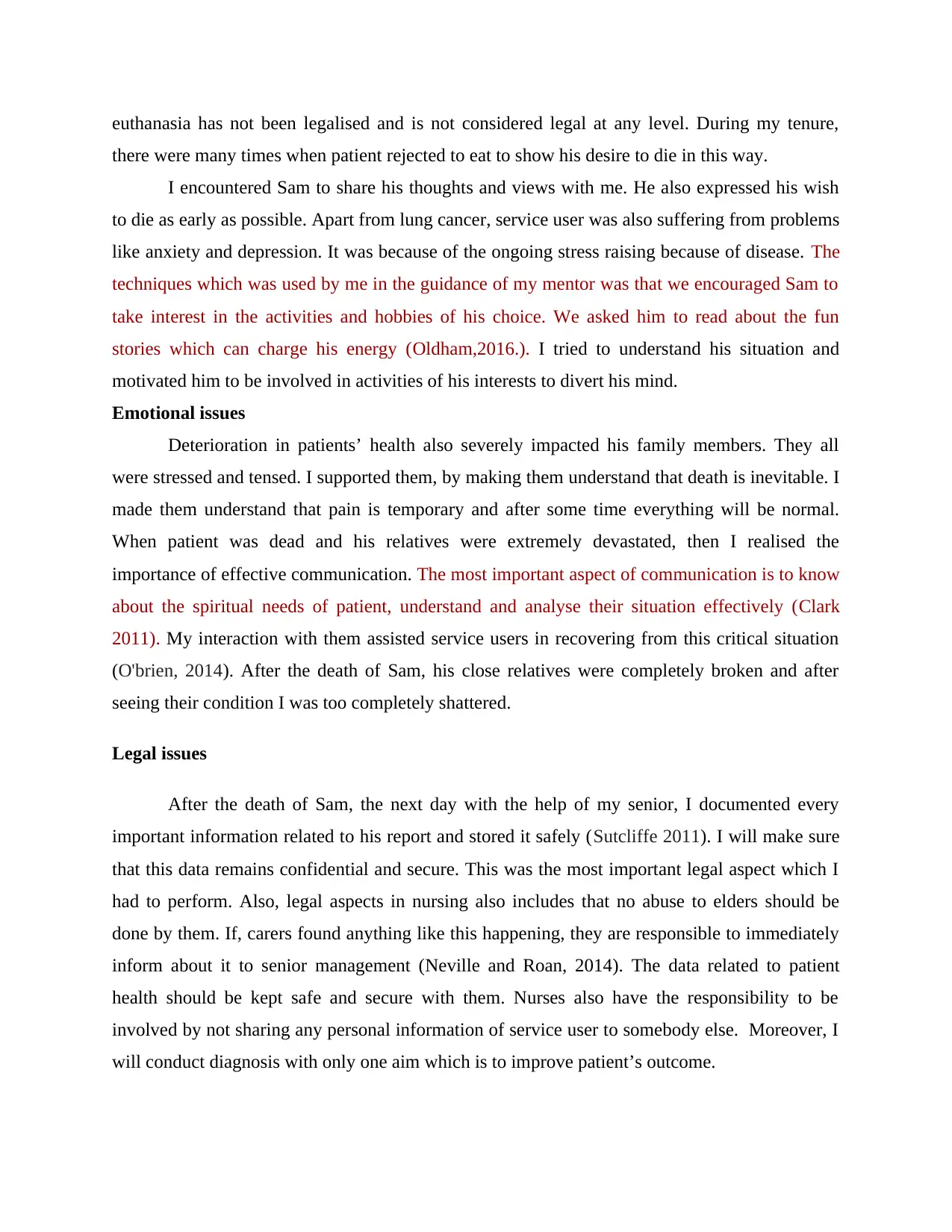
euthanasia has not been legalised and is not considered legal at any level. During my tenure,
there were many times when patient rejected to eat to show his desire to die in this way.
I encountered Sam to share his thoughts and views with me. He also expressed his wish
to die as early as possible. Apart from lung cancer, service user was also suffering from problems
like anxiety and depression. It was because of the ongoing stress raising because of disease. The
techniques which was used by me in the guidance of my mentor was that we encouraged Sam to
take interest in the activities and hobbies of his choice. We asked him to read about the fun
stories which can charge his energy (Oldham,2016.). I tried to understand his situation and
motivated him to be involved in activities of his interests to divert his mind.
Emotional issues
Deterioration in patients’ health also severely impacted his family members. They all
were stressed and tensed. I supported them, by making them understand that death is inevitable. I
made them understand that pain is temporary and after some time everything will be normal.
When patient was dead and his relatives were extremely devastated, then I realised the
importance of effective communication. The most important aspect of communication is to know
about the spiritual needs of patient, understand and analyse their situation effectively (Clark
2011). My interaction with them assisted service users in recovering from this critical situation
(O'brien, 2014). After the death of Sam, his close relatives were completely broken and after
seeing their condition I was too completely shattered.
Legal issues
After the death of Sam, the next day with the help of my senior, I documented every
important information related to his report and stored it safely (Sutcliffe 2011). I will make sure
that this data remains confidential and secure. This was the most important legal aspect which I
had to perform. Also, legal aspects in nursing also includes that no abuse to elders should be
done by them. If, carers found anything like this happening, they are responsible to immediately
inform about it to senior management (Neville and Roan, 2014). The data related to patient
health should be kept safe and secure with them. Nurses also have the responsibility to be
involved by not sharing any personal information of service user to somebody else. Moreover, I
will conduct diagnosis with only one aim which is to improve patient’s outcome.
there were many times when patient rejected to eat to show his desire to die in this way.
I encountered Sam to share his thoughts and views with me. He also expressed his wish
to die as early as possible. Apart from lung cancer, service user was also suffering from problems
like anxiety and depression. It was because of the ongoing stress raising because of disease. The
techniques which was used by me in the guidance of my mentor was that we encouraged Sam to
take interest in the activities and hobbies of his choice. We asked him to read about the fun
stories which can charge his energy (Oldham,2016.). I tried to understand his situation and
motivated him to be involved in activities of his interests to divert his mind.
Emotional issues
Deterioration in patients’ health also severely impacted his family members. They all
were stressed and tensed. I supported them, by making them understand that death is inevitable. I
made them understand that pain is temporary and after some time everything will be normal.
When patient was dead and his relatives were extremely devastated, then I realised the
importance of effective communication. The most important aspect of communication is to know
about the spiritual needs of patient, understand and analyse their situation effectively (Clark
2011). My interaction with them assisted service users in recovering from this critical situation
(O'brien, 2014). After the death of Sam, his close relatives were completely broken and after
seeing their condition I was too completely shattered.
Legal issues
After the death of Sam, the next day with the help of my senior, I documented every
important information related to his report and stored it safely (Sutcliffe 2011). I will make sure
that this data remains confidential and secure. This was the most important legal aspect which I
had to perform. Also, legal aspects in nursing also includes that no abuse to elders should be
done by them. If, carers found anything like this happening, they are responsible to immediately
inform about it to senior management (Neville and Roan, 2014). The data related to patient
health should be kept safe and secure with them. Nurses also have the responsibility to be
involved by not sharing any personal information of service user to somebody else. Moreover, I
will conduct diagnosis with only one aim which is to improve patient’s outcome.
Paraphrase This Document
Need a fresh take? Get an instant paraphrase of this document with our AI Paraphraser
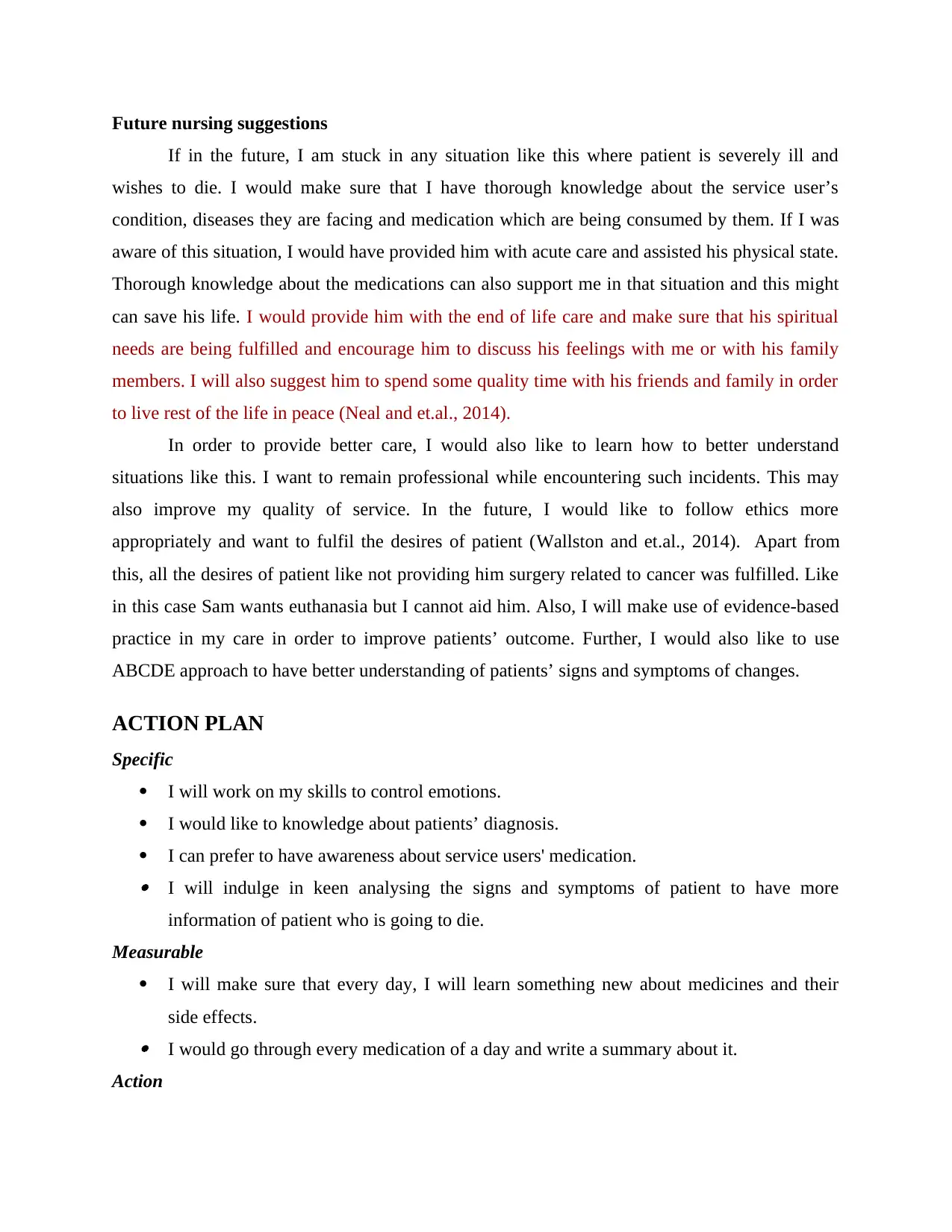
Future nursing suggestions
If in the future, I am stuck in any situation like this where patient is severely ill and
wishes to die. I would make sure that I have thorough knowledge about the service user’s
condition, diseases they are facing and medication which are being consumed by them. If I was
aware of this situation, I would have provided him with acute care and assisted his physical state.
Thorough knowledge about the medications can also support me in that situation and this might
can save his life. I would provide him with the end of life care and make sure that his spiritual
needs are being fulfilled and encourage him to discuss his feelings with me or with his family
members. I will also suggest him to spend some quality time with his friends and family in order
to live rest of the life in peace (Neal and et.al., 2014).
In order to provide better care, I would also like to learn how to better understand
situations like this. I want to remain professional while encountering such incidents. This may
also improve my quality of service. In the future, I would like to follow ethics more
appropriately and want to fulfil the desires of patient (Wallston and et.al., 2014). Apart from
this, all the desires of patient like not providing him surgery related to cancer was fulfilled. Like
in this case Sam wants euthanasia but I cannot aid him. Also, I will make use of evidence-based
practice in my care in order to improve patients’ outcome. Further, I would also like to use
ABCDE approach to have better understanding of patients’ signs and symptoms of changes.
ACTION PLAN
Specific
I will work on my skills to control emotions.
I would like to knowledge about patients’ diagnosis.
I can prefer to have awareness about service users' medication. I will indulge in keen analysing the signs and symptoms of patient to have more
information of patient who is going to die.
Measurable
I will make sure that every day, I will learn something new about medicines and their
side effects. I would go through every medication of a day and write a summary about it.
Action
If in the future, I am stuck in any situation like this where patient is severely ill and
wishes to die. I would make sure that I have thorough knowledge about the service user’s
condition, diseases they are facing and medication which are being consumed by them. If I was
aware of this situation, I would have provided him with acute care and assisted his physical state.
Thorough knowledge about the medications can also support me in that situation and this might
can save his life. I would provide him with the end of life care and make sure that his spiritual
needs are being fulfilled and encourage him to discuss his feelings with me or with his family
members. I will also suggest him to spend some quality time with his friends and family in order
to live rest of the life in peace (Neal and et.al., 2014).
In order to provide better care, I would also like to learn how to better understand
situations like this. I want to remain professional while encountering such incidents. This may
also improve my quality of service. In the future, I would like to follow ethics more
appropriately and want to fulfil the desires of patient (Wallston and et.al., 2014). Apart from
this, all the desires of patient like not providing him surgery related to cancer was fulfilled. Like
in this case Sam wants euthanasia but I cannot aid him. Also, I will make use of evidence-based
practice in my care in order to improve patients’ outcome. Further, I would also like to use
ABCDE approach to have better understanding of patients’ signs and symptoms of changes.
ACTION PLAN
Specific
I will work on my skills to control emotions.
I would like to knowledge about patients’ diagnosis.
I can prefer to have awareness about service users' medication. I will indulge in keen analysing the signs and symptoms of patient to have more
information of patient who is going to die.
Measurable
I will make sure that every day, I will learn something new about medicines and their
side effects. I would go through every medication of a day and write a summary about it.
Action
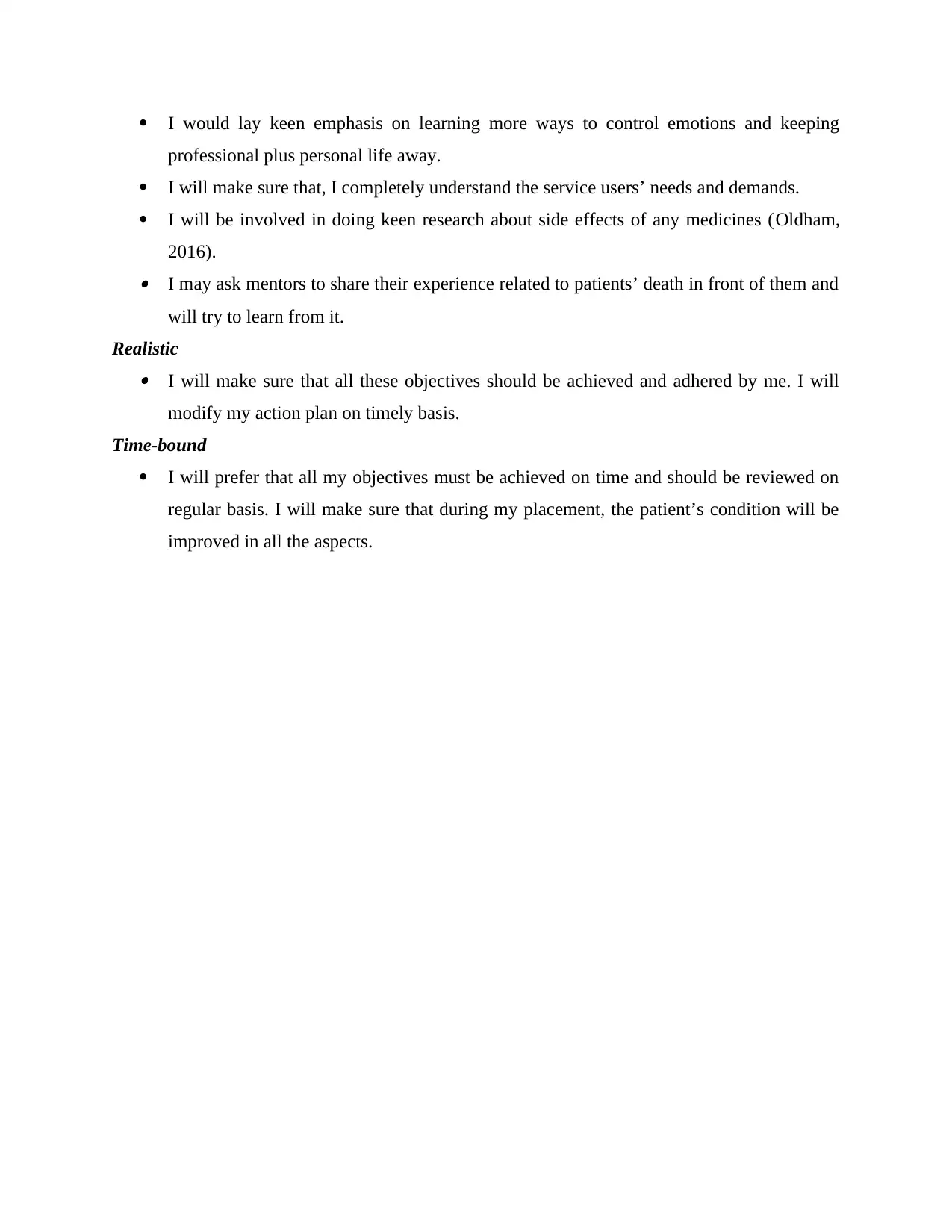
I would lay keen emphasis on learning more ways to control emotions and keeping
professional plus personal life away.
I will make sure that, I completely understand the service users’ needs and demands.
I will be involved in doing keen research about side effects of any medicines (Oldham,
2016). I may ask mentors to share their experience related to patients’ death in front of them and
will try to learn from it.
Realistic I will make sure that all these objectives should be achieved and adhered by me. I will
modify my action plan on timely basis.
Time-bound
I will prefer that all my objectives must be achieved on time and should be reviewed on
regular basis. I will make sure that during my placement, the patient’s condition will be
improved in all the aspects.
professional plus personal life away.
I will make sure that, I completely understand the service users’ needs and demands.
I will be involved in doing keen research about side effects of any medicines (Oldham,
2016). I may ask mentors to share their experience related to patients’ death in front of them and
will try to learn from it.
Realistic I will make sure that all these objectives should be achieved and adhered by me. I will
modify my action plan on timely basis.
Time-bound
I will prefer that all my objectives must be achieved on time and should be reviewed on
regular basis. I will make sure that during my placement, the patient’s condition will be
improved in all the aspects.
⊘ This is a preview!⊘
Do you want full access?
Subscribe today to unlock all pages.

Trusted by 1+ million students worldwide
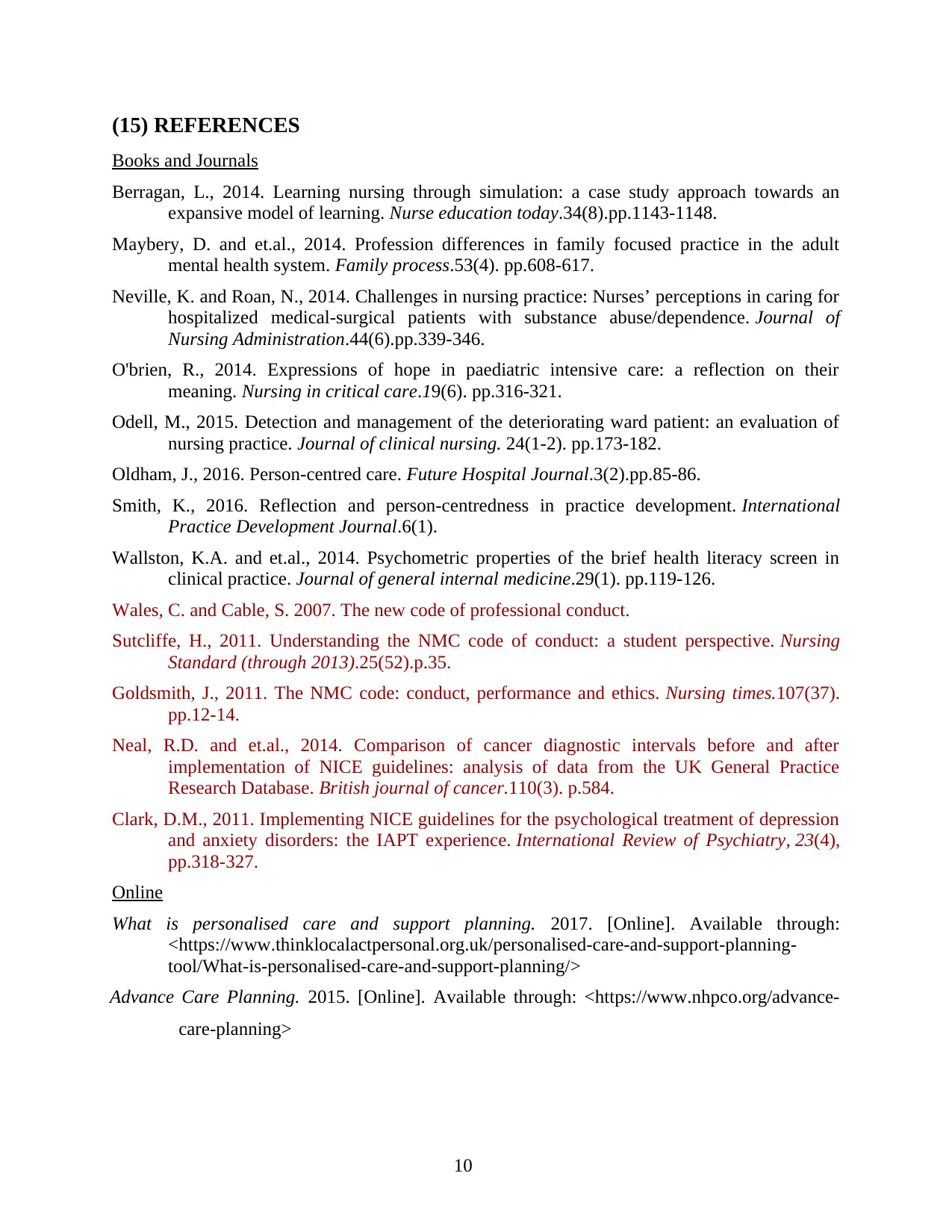
(15) REFERENCES
Books and Journals
Berragan, L., 2014. Learning nursing through simulation: a case study approach towards an
expansive model of learning. Nurse education today.34(8).pp.1143-1148.
Maybery, D. and et.al., 2014. Profession differences in family focused practice in the adult
mental health system. Family process.53(4). pp.608-617.
Neville, K. and Roan, N., 2014. Challenges in nursing practice: Nurses’ perceptions in caring for
hospitalized medical-surgical patients with substance abuse/dependence. Journal of
Nursing Administration.44(6).pp.339-346.
O'brien, R., 2014. Expressions of hope in paediatric intensive care: a reflection on their
meaning. Nursing in critical care.19(6). pp.316-321.
Odell, M., 2015. Detection and management of the deteriorating ward patient: an evaluation of
nursing practice. Journal of clinical nursing. 24(1-2). pp.173-182.
Oldham, J., 2016. Person-centred care. Future Hospital Journal.3(2).pp.85-86.
Smith, K., 2016. Reflection and person-centredness in practice development. International
Practice Development Journal.6(1).
Wallston, K.A. and et.al., 2014. Psychometric properties of the brief health literacy screen in
clinical practice. Journal of general internal medicine.29(1). pp.119-126.
Wales, C. and Cable, S. 2007. The new code of professional conduct.
Sutcliffe, H., 2011. Understanding the NMC code of conduct: a student perspective. Nursing
Standard (through 2013).25(52).p.35.
Goldsmith, J., 2011. The NMC code: conduct, performance and ethics. Nursing times.107(37).
pp.12-14.
Neal, R.D. and et.al., 2014. Comparison of cancer diagnostic intervals before and after
implementation of NICE guidelines: analysis of data from the UK General Practice
Research Database. British journal of cancer.110(3). p.584.
Clark, D.M., 2011. Implementing NICE guidelines for the psychological treatment of depression
and anxiety disorders: the IAPT experience. International Review of Psychiatry, 23(4),
pp.318-327.
Online
What is personalised care and support planning. 2017. [Online]. Available through:
<https://www.thinklocalactpersonal.org.uk/personalised-care-and-support-planning-
tool/What-is-personalised-care-and-support-planning/>
Advance Care Planning. 2015. [Online]. Available through: <https://www.nhpco.org/advance-
care-planning>
10
Books and Journals
Berragan, L., 2014. Learning nursing through simulation: a case study approach towards an
expansive model of learning. Nurse education today.34(8).pp.1143-1148.
Maybery, D. and et.al., 2014. Profession differences in family focused practice in the adult
mental health system. Family process.53(4). pp.608-617.
Neville, K. and Roan, N., 2014. Challenges in nursing practice: Nurses’ perceptions in caring for
hospitalized medical-surgical patients with substance abuse/dependence. Journal of
Nursing Administration.44(6).pp.339-346.
O'brien, R., 2014. Expressions of hope in paediatric intensive care: a reflection on their
meaning. Nursing in critical care.19(6). pp.316-321.
Odell, M., 2015. Detection and management of the deteriorating ward patient: an evaluation of
nursing practice. Journal of clinical nursing. 24(1-2). pp.173-182.
Oldham, J., 2016. Person-centred care. Future Hospital Journal.3(2).pp.85-86.
Smith, K., 2016. Reflection and person-centredness in practice development. International
Practice Development Journal.6(1).
Wallston, K.A. and et.al., 2014. Psychometric properties of the brief health literacy screen in
clinical practice. Journal of general internal medicine.29(1). pp.119-126.
Wales, C. and Cable, S. 2007. The new code of professional conduct.
Sutcliffe, H., 2011. Understanding the NMC code of conduct: a student perspective. Nursing
Standard (through 2013).25(52).p.35.
Goldsmith, J., 2011. The NMC code: conduct, performance and ethics. Nursing times.107(37).
pp.12-14.
Neal, R.D. and et.al., 2014. Comparison of cancer diagnostic intervals before and after
implementation of NICE guidelines: analysis of data from the UK General Practice
Research Database. British journal of cancer.110(3). p.584.
Clark, D.M., 2011. Implementing NICE guidelines for the psychological treatment of depression
and anxiety disorders: the IAPT experience. International Review of Psychiatry, 23(4),
pp.318-327.
Online
What is personalised care and support planning. 2017. [Online]. Available through:
<https://www.thinklocalactpersonal.org.uk/personalised-care-and-support-planning-
tool/What-is-personalised-care-and-support-planning/>
Advance Care Planning. 2015. [Online]. Available through: <https://www.nhpco.org/advance-
care-planning>
10
Paraphrase This Document
Need a fresh take? Get an instant paraphrase of this document with our AI Paraphraser

11

12
⊘ This is a preview!⊘
Do you want full access?
Subscribe today to unlock all pages.

Trusted by 1+ million students worldwide
1 out of 12
Related Documents
Your All-in-One AI-Powered Toolkit for Academic Success.
+13062052269
info@desklib.com
Available 24*7 on WhatsApp / Email
![[object Object]](/_next/static/media/star-bottom.7253800d.svg)
Unlock your academic potential
Copyright © 2020–2025 A2Z Services. All Rights Reserved. Developed and managed by ZUCOL.





